一年级春节英语手抄报内容
一年级春节英语手抄报内容
现如今,大家都看到过许多经典的手抄报吧,手抄报需要巧妙设计,精心安排。你所见过的手抄报是什么样的呢?以下是小编整理的一年级春节英语手抄报内容,欢迎阅读,希望大家能够喜欢。
一年级春节英语手抄报内容
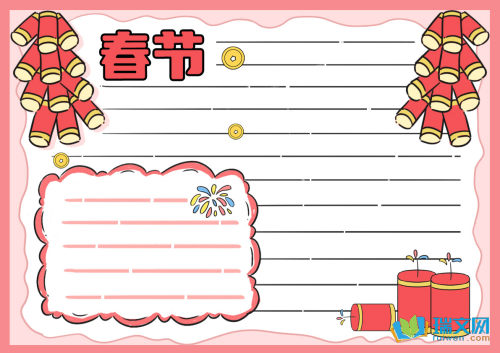
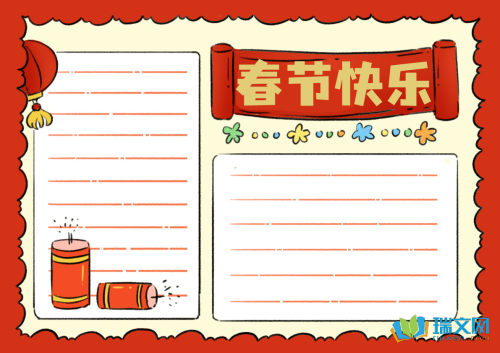
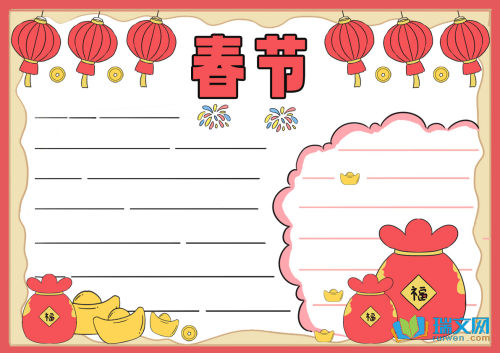
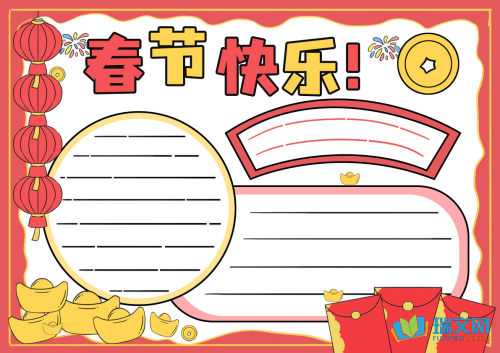
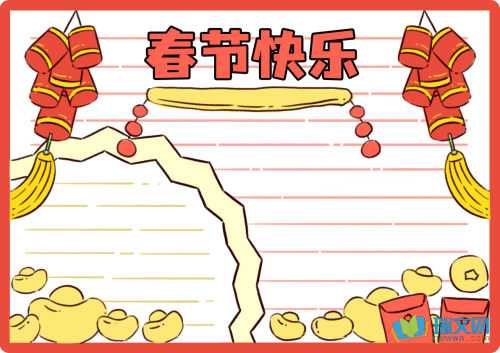
节日名称
The Spring Festival is also known as the Chinese Lunar New Year, commonly known as the New Year, New Year, New Years Day, etc. It is also known as the Chinese New Year or the Chinese New Year. The Spring Festival has a long history and evolved from the ancient times of praying for the new year at the beginning of the year and offering sacrifices. In ancient times, "year" was a tool for harvesting and offering sacrifices, and the character "year" represented the maturity of crops (the earliest writing of the word "year" was the image of a person carrying mature crops). People celebrate the harvest, offer sacrifices to the heavens and ancestors, and drive away ghosts and gods in various forms, gradually forming the custom of celebrating the Chinese New Year.
From an etymological perspective, the name "Spring Festival" consists of two parts: "Spring" and "Festival". "Spring" represents spring, symbolizing the beginning of a year, full of vitality, and the revival of all things. In traditional Chinese culture, spring is seen as a symbol of life and hope. "Festival" means a festival, which is a specific and significant day, and people will hold special celebration activities. Therefore, "Spring Festival" literally means a festival of spring, or a festival celebrating the arrival of spring. This also reflects the important position of the Spring Festival in the hearts of Chinese people. It is not only an ordinary holiday, but also a special moment symbolizing new life, hope, and reunion. As for the origin of the naming of the Spring Festival, as it marks the beginning of the Lunar New Year and coincides with the return of spring to the earth and the revival of all things, people named it "Spring Festival" to celebrate the arrival of a new year and the rebirth and renewal of nature. This naming also reflects the reverence and respect for time and nature in traditional Chinese culture.
Since ancient times, the first month of each year has been called January or January. Although the names are the same, the specific dates of the first month in different dynasties of ancient China were not the same. The Spring Festival was not a festival in Chinese history, but specifically referred to the "beginning of spring" in the 24 solar terms. During the Northern and Southern Dynasties, "Spring Festival" generally referred to the entire spring. The concept of "Spring Festival" was gradually introduced during the Republic of China period. After the Xinhai Revolution, the Gregorian calendar was adopted to record the year, and the first day of the lunar month was renamed "Spring Festival", while the first day of the Gregorian month was renamed "New Years Day".
原文
Spring Festival cleaning
The Spring Festival is near, and we have a thorough cleaning to welcome the New Year.
My mother gave me the task of polishing the glass, I stood upright, with a wave of my hand, shouted "to obey", and went to work hard.
I was armed, ready to fight, carrying "weapons" and "marching" to the destination. I am so happy! At this time, "the enemy" came, that is the big black dot of the rice grain, I take the dishcloth, hard rub, just can not wipe that naughty little black spot. Im a little discouraged. The little black dot can be happy, dance to the dance, as if to laugh at me, even I can not wipe out, still do what "hua mulan"! Who says I cant get rid of, I "shout" to come to brush, with fingernails dig, finally dug out those little black spots. I cant help thinking that failure is the mother of success.
To see my mother, I thought my mother was still sweeping the floor, but my mother had already been lying in bed. When my mother saw me, I burst out laughing, and I ran to the mirror and said, "haha, the naughty little black dots are all creeping up on my face! "
This Spring Festival sweep clean our house spotless, our family can be happy to welcome the New Year.
节日习俗
Buy New Years goods
Chinas traditional Chinese New Year culture has a long and rich history, and a variety of Chinese New Year customs have emerged throughout the country, with distinct characteristics from north to south. Although customs vary in different regions, preparing New Years goods and giving New Years gifts are almost a must-have throughout the country. The process of purchasing New Years goods, including food, clothing, wearing, using, pasting (New Years red), giving (New Years greetings) gifts, etc., is collectively referred to as "New Years goods", and the process of purchasing New Years goods is called "processing New Years goods". Selling New Years goods is an important activity for Chinese people during the Spring Festival.
Harvest meat
The folk proverb goes "On the 26th day of the twelfth lunar month, cut the meat of the New Year", which means that on this day, the main preparation is for meat for the Chinese New Year. The reason why "cutting New Years meat" is included in the New Years rhyme is because the agricultural society and economy are not developed, and people can only eat meat during the annual festival, so it is called "New Years meat".
Sacrificial Kitchen
The folk worship of the stove originated from the ancient custom of worshipping fire. As stated in "Shi Ming": "Stove. Create, create food." The responsibility of the Kitchen God is to control the stove, manage food, and later expand it to examine the good and evil of humanity, in order to bring good and evil. The worship of the Kitchen God has a history of thousands of years in Chinese folklore, and it reflects the Chinese peoples pursuit of the dream of having more than enough food and clothing.
Sweeping dust
In folk culture, there is a custom of sweeping the house on the eve of the New Year on the 24th day of the twelfth lunar month. The folk saying goes, "Sweep the house on the 24th day of the twelfth lunar month.". Commonly known as "Sweeping Dust Day". Sweeping dust is a year-end cleaning, where every household has to clean the environment, clean various utensils, dismantle and wash bedding and curtains, sweep the courtyard of Liulu, brush off dust and dirt, and dredge open channels and hidden ditches. Everywhere is filled with a joyful atmosphere of cleaning and welcoming the Chinese New Year with cleanliness. According to folk belief, because "dust" sounds like "Chen", sweeping the dust before the New Year has the meaning of "removing the old and replacing the new". The purpose of sweeping away dust is to sweep away all the misfortunes and misfortunes, in order to pray for a clear and auspicious year ahead.
stay up late on new years eve
The custom of observing the New Year has a long history. All houses light the New Years fire, families gather together, and keep the "New Years fire" burning, waiting for the moment of bidding farewell to the old and welcoming the new. On New Years Eve, the lights remain lit all night, known as "lighting the New Years Eve" or "lighting the New Years Eve fire". All houses are lit with candles, and special candles are also lit under the bed to enrich the familys wealth in the coming year.
New Years money
After dinner, elders should distribute pre prepared New Years money to younger generations. New Years money symbolizes warding off evil spirits and warding off ghosts, and blessing peace in folk culture. The original purpose of New Years money was to suppress evil and drive away evil spirits. Because people believe that children are susceptible to sneaky attacks, they use lucky money to suppress and ward off evil spirits.
Wandering God
Wandering gods, also known as Holy Driving Parade, Wandering Master, Camping Master, Wandering Bodhisattva, Wandering God Competition, Annals, Welcoming Gods, Welcoming New Year, Spring Festival, Incense, Bodhisattvas Hometown, Carrying Gods, and Visiting Gods, etc., refer to people inviting walking deities to the temple during the New Year or other festive occasions, and then carrying them out of the temple to enjoy the worship of the peoples incense, symbolizing the landing of gods among the people, inspecting the countryside, and blessing the peace of the environment. Along the way, the wandering gods are accompanied by colorful performances such as gongs and drums, suona, divine dolls, lion dances, dragon dances, fluttering colors, flags, lanterns, eight notes, acrobatics, and band performances. It is a traditional folk activity that integrates worshipping gods, praying, celebrating, and entertaining guests.
翻译
春节大扫除
快要过春节了,为了迎接新年我们家进行了彻底大扫除。
妈妈给我布置的任务是擦玻璃,我立正,手一挥,大喊一声“遵命”,就去埋头苦干了。
我全副武装,准备应战,举着“兵器”,向目的地“进军”。我快活得不得了!这时,“敌人”来了,那就是米粒大的'黑点,我拿着抹布,使劲擦,就是擦不掉那调皮小黑点。我有点泄气了。小黑点可高兴了,手舞足蹈起来,好像在嘲笑我,连我都消灭不了,还做什么“花木兰” ! 谁说我消灭不了,我“喊”来了刷子,用手指甲挖,总算挖掉那些小黑点。我不禁想起了一句话:失败乃成功之母。
去看看妈妈,我原以为妈妈还在扫地,谁知妈妈早就躺在床上睡觉了。妈妈见了我就哈哈大笑起来,我忙跑到镜子前:“哈哈,那调皮的小黑点都爬到我脸上来了! ”
这次的春节大扫除把我们家打扫的一尘不染,我们家终于可以快快乐乐的迎新年了。
